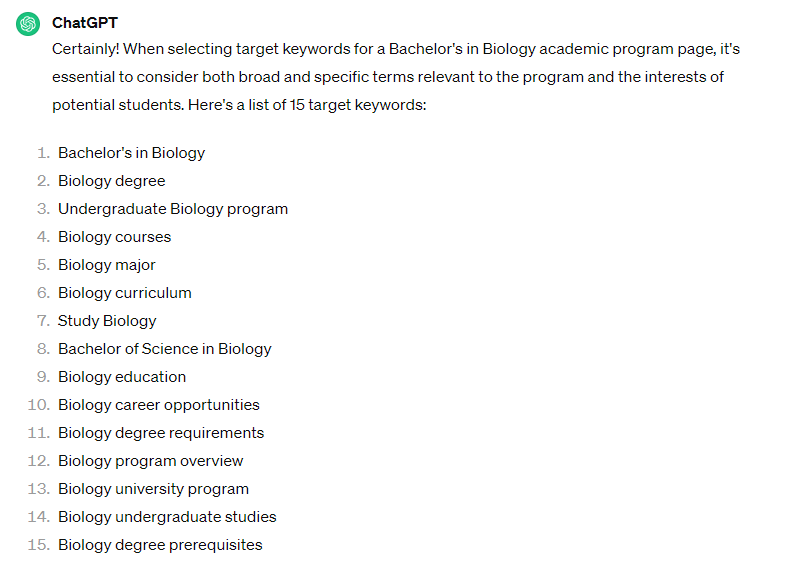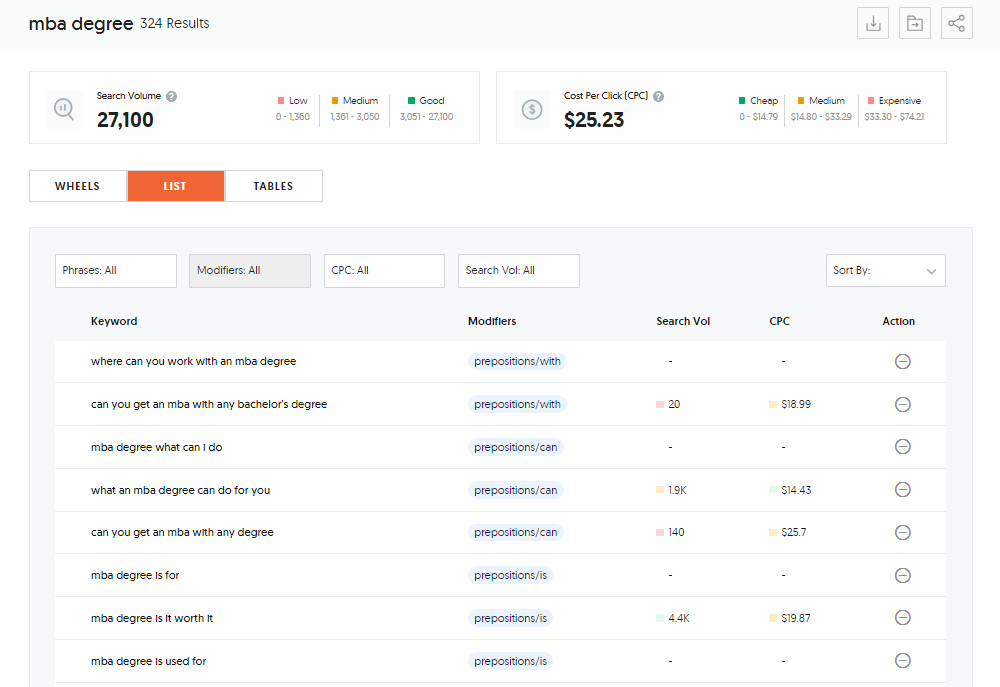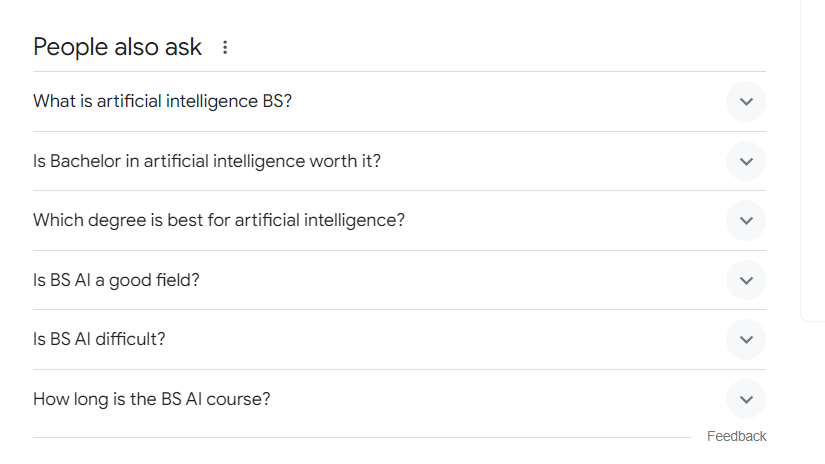 Jul 29, 2024
Persona
Jul 29, 2024
Persona
When developing a new Search Engine Optimization (SEO) strategy, it can be tempting to immediately dive into the most time-consuming tasks—like writing the content—and assume you’ll figure out your keywords later. While keyword research may seem inconsequential, it ultimately forms the foundation of your on-page SEO strategy.
Taking an intentional approach to your keyword research allows you to find untapped ranking opportunities, better understand prospective students’ needs, and increase website traffic and engagement with content that resonates with your target audience.
In this guide, you will learn about the following topics:
- How Does SEO Work?
- What Are Keywords, and Why Do I Need Them?
- Types of Keywords
- A Step-by-Step Guide to Keyword Research
- Keyword Strategies
- Tips on How to Thoughtfully Use Keywords in Your Content
- Refine Your Keyword Research to Increase Your Institution’s Website Traffic
How Does SEO Work?
Search Engine Optimization is a decades-old practice that has significantly evolved over the years. Today, SEO has two parts: technical SEO and on-page content SEO. With keyword research, we’re talking about optimizing on-page content and metadata. You want to use the right keywords in your written content so that prospective students can easily find your website when they look for information using search engines like Google and Bing.
What Are Keywords, and Why Do I Need Them?
A keyword is a word or phrase someone types in Google and other search engines to find information, products, or services—for example, “nursing programs near me.”
Keywords are essential to SEO because they signal to search engines that your content is highly relevant to a user’s query. Strategically incorporating these keywords into your institution’s content, metadata, and header tags improves your site’s visibility in search engine results pages (SERPs) and attracts more organic traffic.
In higher-ed marketing, we can think of keywords as the vocabulary of prospective students. It’s the language they use to discover where they want to attend school and which degree they wish to pursue. When your institution’s content closely matches prospective students’ search terms, the likelihood of your site appearing in the SERP increases.
Types of Keywords
Keywords can fall into various categories: short-tail versus long-tail keywords and branded versus non-branded. Understanding their different functions and potential benefits helps you refine your query selection.
Short-Tail vs. Long-Tail
Short-tail keywords are one- to three-word phrases generally focusing on a broad topic. Higher education examples include “MBA degree” or “online nursing programs.” These are high-competition keywords, meaning hundreds or thousands of websites use them, so appearing in the top 10 search results on Google is challenging.
Long-tail keywords are phrases that are four words or more. They are often location-based or query-based keywords, such as “Business Degrees in NYC” or “Is an MBA degree worth it?” Long-tail keywords are your friends! Because they are more specific, fewer websites target them. It’s easier to achieve higher rankings on Google when you focus on long-tail keywords.
Branded vs. Non-Branded
Branded keywords are specific terms or phrases that include the name of a particular brand or company. In the higher-ed world, branded keywords include your college or university’s name or nickname, such as “Harvard School of Medicine” or “Ole Miss.” Branded keywords target users already familiar with your institution, which signals a higher level of brand awareness and search intent and may translate into a higher click-through rate (CTR).
Alternatively, non-branded keywords do not include your institution’s name. They are more general and encompass a broader range of search intent. For colleges and universities, the most common non-branded keywords are academic programs or degree names like “Bachelor of Arts in Philosophy” or “biomedical engineering major.” Even though it’s more challenging to achieve a high ranking with non-branded keywords, it’s valuable to target these types of keywords because your institution can capture prospective students who are not familiar with your school.
In addition, because non-branded keywords typically have higher monthly search volumes, targeting them can help generate more impressions for your website and increase your visibility.
To discover more about essential SEO metrics like branded versus non-branded traffic, read our Measuring SEO Performance 101 blog post.
A Step-by-Step Guide to Keyword Research
With your deepened understanding of the importance of keywords and their variations, let’s dig into how to perform comprehensive keyword research.
Step 1: Identify Your Topic
Whether you want to create new thought leadership content or revitalize your academic program pages, your keyword research begins with brainstorming.
This may happen in a tiered approach. For example, start by compiling a list of the topics you want to be the focus of your website. For colleges and universities, this often means a list of priority degree programs you want to promote. It may also mean a list of campus activities, clubs, financial aid resources, or admission information.
Once you identify your overarching focus areas, select individual web pages you plan to optimize or create. Each page you optimize will have a unique set of targeted keywords and a strategy that supports its performance.
Remember, your site’s overall SEO performance is the accumulation of individual page performance. So, while this page-by-page approach may seem tedious, it is an investment in your website’s future success. SEO is a long-term strategy, so this will take time, effort, and some patience, but it will help you build stronger, more robust content for your institution.
Once you have this framework for your marketing strategy, it’s time to get into the data.
Step 2: Use Free Keyword Research Tools to Start Exploring
Keyword research is a data-driven process. To get your college or university’s content in front of prospective students, you need to use keyword research tools to find out what terms people are searching.
Here are a few free keyword research tools that I recommend:
Google Search Console
One of the best free tools you can use to kick-start your keyword research is Google Search Console (GSC). GSC is a platform that offers valuable insights into how your website is appearing and performing in Google organic search, including all the queries your web pages rank for and their clicks, impressions, CTR, and position. By analyzing the current state of your site and letting real-time and historical data guide your efforts, you can identify well-performing search terms and potential keyword opportunities to integrate into your strategy.
Google Keyword Planner
This free tool from Google is great for finding short-tail keywords. We recommend starting here for every page. Whether you have specific queries in mind or are looking for inspiration, plug in your page topic and see the related queries come up.
Google Keyword Planner offers the most data insights for each keyword, including the average monthly search volume, the three-month percentage of change, and the year-over-year (YoY) change, contextualizing larger trends for that query. Additionally, it gauges the level of competition for each keyword from low to high.
For example, here is what results come in when we search for “MBA degree”:
AnswerThePublic
This is a fantastic keyword research tool for finding long-tail queries in the form of questions. We especially recommend using this tool to better understand the questions your prospective students are asking. For example, if you are interested in learning more about the questions they have when searching for their ideal MBA degree, using AnswerThePublic reveals that users want to know about the degree’s value, the cost of the program, and possible career outcomes. These long-tail keywords can guide the structure of your content, ensuring that when users visit your website, they find all the answers they seek.
Depending on your marketing strategy, AnswerthePublic also allows you to search queries by search engine—Google, Bing, and YouTube. Please note that while AnswerthePublic does offer a free account, you are limited to three daily searches.
Here are some results for “MBA degree”:
ChatGPT
As generative AI becomes popular, you might wonder if you could use tools like ChatGPT to kick-start the brainstorming portion of your keyword research.
ChatGPT can produce large lists of related keywords based on your prompt. However, the quality of your prompt largely determines the quality of the generated responses. To get the best results, your prompt should be as specific as possible, limit the number of tasks it asks the bot to complete, and give ChatGPT a role to inhabit.
For example, if you are optimizing a BS in Biology program page, you can start with a simple prompt, such as “Act as an SEO content specialist. Please create a comprehensive list of long-tail keywords for a Bachelor of Science in Biology degree page.” You can also include how many keywords you’d like, certain genres of keywords like admissions- or career-related queries, or other specifications to customize your list.
However, relying on the keyword list it generates is not enough; rather, it’s merely a starting point. ChatGPT and other AI technologies are experimental and may not return accurate results. To ensure you’re selecting the correct queries, you should parse through the output to determine the usefulness and relevance of the keywords provided.
You can do this by plugging the keywords into Google to see if they yield related search results and using Google Keyword Planner to get more insightful data on their search trends. When used correctly, ChatGPT can increase the efficiency of your research, but ultimately, you are best equipped to determine the quality of selected keywords.

Once you run your ideas through these three tools, you should be able to create a list of three to five related keywords that you can target in your on-page content. These are your “target keywords.”
Step 3: Search Listening
Another essential step of your keyword research is “search listening,” which is the practice of exploring the digital landscape to see what kind of information is in demand regarding your selected topic. Search listening—can provide insight into emerging trends, frequently asked questions, larger discussions, synonymous queries, and more.
When perusing the SERP, you can reference Google’s “People Also Ask” section, which highlights related question-based terms and websites that provide helpful and relevant information to answer these queries.
You can also visit popular online forums like Reddit or Quora. Browsing these platforms allows you to see what questions and concerns are gaining traction in online conversations and determine how your institution’s site can be the answer to a student’s problem. By integrating search and social listening into your research, you can develop a robust strategy that targets current search behavior and anticipates future trends.
So that’s it—you’ve finished your keyword research, right? Not quite…
Step 4: Identify the User Intent for Your Target Keywords
Beyond choosing related queries with the highest search volume, there is an element of semantics—or meaning—you should consider when finalizing your target keywords.
It’s essential to understand the users’ intention behind the keywords you’ve found. Targeting the wrong intention may result in low-quality traffic that won’t contribute to your enrollment goal.
When determining the intent, ask these questions: What does this keyword mean to the user? What kinds of answers are people looking for when they use these terms? By matching prospective students’ search language, you have a better chance of getting your content in front of them and ensuring that it delivers the information they seek.
Luckily, understanding user intent is easy. Just run a Google search of your target keywords and see what results you get. You’ll immediately notice a theme. If the theme is the same or similar to the content you want to write, great—target that keyword! If the theme is different, it might be a good idea to scratch that term.
Keyword Intent Examples
For example, let’s say you want to focus on careers with a sports management degree. Your list of target keywords includes the phrases “sports management careers” and “sports management jobs.”
When you search for “sports management careers,” you find a list of university websites and other resources that describe the different career paths for sports management majors. We’ve got a match! This is the kind of information your institution wants to share. “Sports management careers” is a good target keyword.
Then you search for “sports management jobs.” This time, you get forums of job listings and recruiters. This is obviously not appropriate for your institution, and you would never be able to get your careers page to appear in the top 10 search results for this term. You can erase “sports management jobs” from your list of target keywords.
When you have the right user intent behind your keyword strategy, you can appear in Google search and provide relevant information to qualified prospective students.
Keyword Strategies
Now that you’re familiar with the various types of keywords, which tools to use, and how to uncover search intent, you can incorporate an additional level of strategy into your keyword selection to make your college or university’s content more competitive.
While the overview of strategies outlined below is not exhaustive, utilizing them in your keyword research and content creation can yield distinct benefits for your institution’s site.
Use the “Striking Distance” Strategy
One of the quintessential SEO keyword strategies you can incorporate into your optimization efforts is targeting queries within “striking distance“ of the first page of search results. Utilizing the “striking distance” strategy allows you to capitalize on already well-performing keywords and try to advance your ranking.
Not every web page may be a candidate for this strategy. It’s best to select pages with keywords ranking on Google’s second or third page. Since the distance to the top 10 results is shorter, you have a better chance of improving your rankings. You can gather this data using tools like Google Search Console (GSC) or SEMrush to see your current keyword rankings and gauge the level of competition for these queries. Typically, you want to target keywords with high search volumes and lower competition.
Once you’ve chosen the keywords within “striking distance,” you can strategically weave them through your metadata, header tags, and body copy to improve the relevancy of your content and work toward achieving a top-10 ranking.
Conduct a Competitor Analysis
Understanding how other colleges and universities are taking up space in the SERP landscape enables you to remain agile in your digital marketing efforts and stay one step ahead.
You can begin by identifying your main competitors who are targeting the same prospective student audience and reviewing their academic program page offerings to see where there are significant overlaps in their content and targeted keywords.
With your primary competitors selected, use SEMrush and their Keyword Gap tool to input one of your page URLs and three competitors’ URLs. This allows you to compare how your competitors rank for competitive queries and chart out patterns in their keyword strategy. In turn, you can utilize this insight to pinpoint what’s performing well and to identify gaps in your SEO strategy, including new keywords to target and previously untapped topics.
Target Location-Based Keywords
Location-based keywords are what their name implies. They are terms that incorporate specific geographic locations, such as “MBA in NY” or “BSN programs in California.”
As an SEO strategy, targeting location-based keywords has numerous benefits. Using location keywords in your content helps improve the relevance of your website for users searching within a particular geographic area. In turn, this can support higher rankings in local search results and increased visibility, organic traffic, and brand awareness.
Want to learn more about local SEO? Read our blog, “How to Optimize your Google Business Profile.”
Tips on How to Thoughtfully Use Keywords in Your Content
Now that you’ve selected your target keywords, you can start your on-page optimizations! But remember that you don’t have to squeeze as many target keywords as possible into your content to perform well. In fact, the excessive and unnatural use of keywords—referred to as “keyword stuffing”—is counterproductive.
Incorporating too many keywords into your content can negatively impact it by making it sound spammy and affecting the user experience. Because Google strives to provide users with a search experience that offers helpful, high-quality, and relevant content, Google may penalize your website for keyword stuffing, resulting in lower rankings or decreased visibility in search results. Learn more about Google’s quality rater guidelines.
Keyword usage is always quality over quantity. A part of an effective keyword strategy is placement. Make sure to put your keywords in the header tags, especially the H1, and at the beginning of paragraphs. This helps Google’s algorithm better understand the purpose of your web page and can favorably impact its performance. When writing, you might compose a rough draft of your content and then go back and plug in your target keywords. You can also begin the drafting process by mapping out where your keywords will go and then building your content around this framework.
Whichever approach you choose, skillfully weaving search terms into the page’s content allows prospective students to focus on valuable information, such as your institution’s degree programs, admission and financial aid processes, and student resources, empowering them to choose your institution.
For more insight, learn about creating high-performing program pages.
Refine Your Keyword Research to Increase Your Institution’s Website Traffic
Equipped with these techniques, you are ready to dive into SEO keyword research. By following these easy steps to find and utilize your target keywords on your website, you’ll generate more organic traffic, deliver engaging content, and ultimately find more qualified applicants for your institution.
Looking for support in your SEO work? Carnegie’s team of SEO experts can help. Connect with us today to discover how our search engine optimization services can position your higher-ed institution for success.



